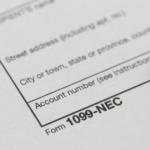As a business owner, staying compliant with tax regulations is essential—and sending out 1099 forms is an important part of that. But figuring out who exactly needs a 1099 can be tricky. Here’s a clear breakdown to help you navigate this tax obligation.
What is a 1099 Form?
Businesses are required to issue Form 1099-NEC (Nonemployee Compensation) or 1099-MISC to certain payees (vendors) to report specific types of payments.
Who Needs a 1099-NEC?
You must issue a 1099-NEC to anyone who meets all of these criteria:
- They are not your employee
If the worker is on payroll and receives a W-2, they don’t get a 1099. - You paid them $600 or more
This applies to payments for services performed, not goods. - They are an individual, partnership, or LLC taxed as a sole proprietor
You generally don’t need to send a 1099 to corporations, but there are exceptions! - The payment was for business purposes
Payments for personal expenses (like a handyman for your home) don’t require a 1099.
Exceptions to the “No Corporations” Rule
Even if the recipient is a corporation, you must send a 1099-NEC or 1099-MISC if you paid them:
- $600 or more for legal services (lawyers always get 1099s, regardless of their business structure).
- $600 or more in medical or health care payments (e.g., to healthcare providers or medical corporations).
Other Common 1099 Recipients
- Independent contractors (e.g., graphic designers, consultants, or freelance writers).
- Rent payments made to landlords or property management companies, reported on 1099-MISC.
- Royalties of $10 or more, reported on 1099-MISC.
Payments That Don’t Require a 1099
You generally don’t need to send a 1099 for:
- Payments made via credit card or payment processors like PayPal or Stripe (these are reported on a 1099-K by the processor).
- Employee wages (these are reported on a W-2).
- Payments to C corporations or S corporations (except for the exceptions above).
- Payments for merchandise, goods, or tangible products.
Steps to Prepare and File 1099s
- Collect W-9 Forms
Before paying any vendor or contractor, have them fill out a Form W-9. This form provides the information needed for their 1099, including their Taxpayer Identification Number (TIN). - Keep Accurate Records
Track all payments to contractors and vendors throughout the year, ensuring you have clear records of amounts and payment methods. - Meet Deadlines
- Provide 1099s to recipients by January 31st.
- File copies with the IRS by January 31st (if filing electronically).
Get Professional Help
The rules around 1099s can get complicated, especially with exceptions and special cases. If you’re unsure about your obligations, consulting a professional can save you time and penalties.
At The Balanced Hub, we’re here to simplify your bookkeeping, payroll, and tax compliance so you can focus on growing your business. Contact us today for support with 1099 preparation and filing!
Need help preparing your 1099s?
Let us handle the details! Contact us at lisa@thebalancedhub.com or 641-552-0746 to get started.





